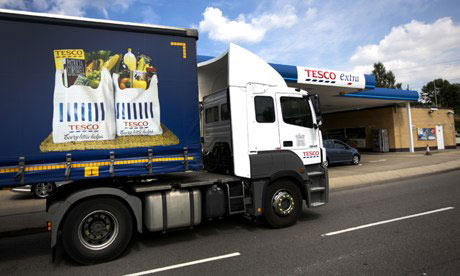
|
Tesco is using its food delivery lorries to pick up rubbish from stores in an attempt to cut costs. The UK's largest retailer has stopped using waste contractors to pick up and dispose of general rubbish, including unsold food, from its 600 largest supermarkets. Instead, bags of waste are piled into metal wheeled cages lined with clear plastic. These cages are picked up by the same trucks that deliver food to the stores once they have emptied their load. The trucks drop off the rubbish at a waste centre before returning to Tesco's distribution centres to pick up more groceries and food to start the cycle again. A Tesco spokeswoman said the system, which does not involve the smaller vans that make home deliveries to customers, was more environmentally friendly. "We have recently introduced a new way of managing waste in some of our stores, which will remove 20,000 additional trips a year and reduce our carbon emissions by 4.5 tonnes a year." The spokeswoman insisted there was no risk to food hygiene: "We have high standards of hygiene and food safety, and we require all vehicles to be inspected and cleared after every trip, with additional cleaning if required, alongside regular deep cleans." However, notices posted at Tesco's recycling centre, seen by the Guardian, suggest only a quarter of the delivery fleet is sanitised or washed each week, although any driver is able to request a wash for his lorry if he feels it necessary. One source close to the process said the thin plastic used to line the cages that transport bin bags was easily damaged so that liquid from putrefying rubbish could spill on to the floor of lorries. Meanwhile store staff sometimes did not have time to sort or wrap the rubbish adequately. The source said there was not the time or resources to wash every trailer after each collection of general waste. With hundreds of Tesco stores around the country, some lorries can do several deliveries a day. "I know they can't live up to the expectation of any reasonable customer," he said. "It's penny pinching and it's going to blow up because when it gets hot that smell is going to magnify 10-fold," said the source. The source said, however, that food would never touch the floor of the delivery trailer because it is packaged and transported within wheeled cages. Legally, all vehicles and containers used for transporting food must be kept clean and well-maintained to ensure food is not contaminated. A spokesperson for the Food Standards Agency said: "The law is clear. where non-food products are carried there must be suitable cleaning before foods are carried. Receptacles or containers used to transport food cannot be used to transport anything else where this might lead to contamination." It is not uncommon for supermarkets to transport dry waste, such as cardboard or plastic, from stores to recycling centres in empty grocery delivery lorries. The process is called backfilling and saves both money and fuel, so is seen as environmentally friendly. Only one other supermarket – Sainsbury's – backfills with general waste and under its system bin bags are put into large plastic crates that are washed each time before reuse. A spokesperson said: "We never have waste or recyclate on board our delivery lorries at the same time as products for sale in our stores." Marks & Spencer backfills its food trucks with food waste, but this is stored in specially designed large cardboard boxes lined with a heavy plastic. Asda, Morrisons and Waitrose all said they never transport general waste in their food lorries. Neal Austin, Morrisons' logistics and supply chain director, said: "Technically, we would have a concern about the risk of contamination given the closed environment within the trailers. More importantly, we don't believe our customers would feel comfortable knowing that the fresh food they were eating had been delivered in a lorry that a few hours earlier had been carrying waste food products." |
查看譯文 這家英國最大的零售商不再使用垃圾承包商從其600家大型超市里收取和處理日常垃圾(包括未售出的食物)了。所有的垃圾都打成包,堆放在有金屬輪式的籠子中,并用透明膠帶挷住。食品車把食品送到商店之后,在清空后把這些籠子裝上,運到垃圾處理中心倒掉,然后再返回樂購配送中心取新貨物,如此周而復(fù)始。
據(jù)知情人士透露,捆綁運送垃圾袋的籠子用的塑料膠條很薄,容易損壞,因此,腐爛的垃圾中的液體會灑在車廂里。同時,商店工作人員有時沒有時間能充分地分類或打包垃圾。
根據(jù)法律規(guī)定,所有運輸食物的車輛和容器都必須保持清潔和完好,以確保食物不受污染。 英國食品標(biāo)準(zhǔn)署的發(fā)言人說:“法律是明確的。在運送非食品貨物之后,要進行適當(dāng)清理,才能繼續(xù)運送食物。運送食物的容器不能用來運送其他任何東西,否則會造成食品污染。”
阿斯達(Asda)、莫里森(Morrisons)和維特羅斯(Waitrose)都稱自己從來沒有用運食物的車運過垃圾。 莫里森公司(Morrisons)的物流與供應(yīng)鏈主管尼爾?奧斯汀說:“從技術(shù)上來看,我們擔(dān)心貨車的封閉空間很容易弄臟食物。更重要的是,顧客如果得知,運送他們食物的貨車就在幾小時前裝過垃圾的話,肯定會不舒服的。” (譯者 陳慧潔buaa 編輯 丹妮) |
